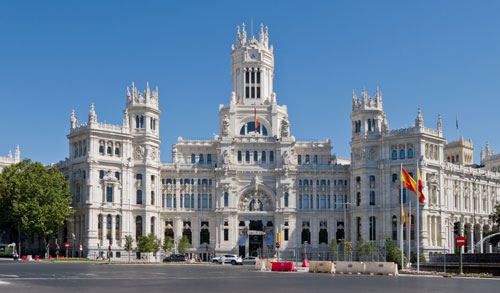Amazing Facts » Spain

Awesome Facts about Spain
Spain occupies the major part of the Iberian Peninsula having coastlines towards the Atlantic Ocean and the Mediterranean Sea. The neighbouring countries of Spain are France and Portugal, which are well connected with the country. The border of Spain shared with Portugal is one of the oldest borders in Europe. The capital of Spain, Madrid receives a number of tourists from all over the world with majority of the tourists arriving from France.
Spain was one of the supreme colonial powers in ancient times in Europe. The discovery of the new lands of Americas by the renowned explorer Christopher Columbus in 1492 established the country as a powerful colonial nation. The Spanish Empire was one of the most powerful countries during the 16th century. It established colonies in different parts of the world through conquest, alliance and inheritance.
It was during this time the first circumnavigation was carried out by the famous explorer Ferdinand Magellan who was selected by the king of Spain himself. The single Spanish expedition managed to circumnavigate the world from 1519 to 1522. However, the defeat of the Spanish Armada by the British in 1588 lead to the decline of its former glory in the world stage.
In later years, the country was one of the few who remained neutral during the First World War and the Second World War. After the death of the dictator General Francisco Franco in 1975, democracy was restored in the country and the developments that took place in the country in later years brought the country at par with other European countries.
Spain has a total area of about 505,370 square kilometres as per the United Nations Statistics Division. The population of Spain as on January 2016, was estimated to be 47.8 Million people, with a population density of about 95 people per square kilometre.
Spain entered the European Union in 1986 and the current type of government ruling the country is parliamentary monarchy. In Spain, the citizenship of the country can be acquired by descent only whereby one of the parents must be a citizen of Spain. In addition, there is provision for dual citizenship with selected Latin American countries and at least 10 years of residency is required for naturalization for people of other countries wishing to be a citizen of Spain. However, for people belonging to the European Union countries only five years of living in Spain is required.
Almost 94% of the population of Spain are Roman Catholic and only 6% of the population follows other religions. The country of Spain is comprised of autonomous regions and two autonomous cities with their own parliaments and regional governments, which gives a distinct identity to the country. These autonomous regions has different languages, thus the languages spoken in the country of Spain are Castilian Spanish, Catalan, Basque and Galician. Even in modern times, the Spanish language continues to be one of the most popular languages spoken around the world.
The climate in Spain varies throughout the country depending on the closeness to the sea and the geographic position of the place. In some places, the Mediterranean climate prevails which is warm and dry in the summer season while in places close to the sea, the climate is moderate and temperate. The traditional and staple agricultural produce of Spain includes olives, citrus fruits, vegetables, wine, strawberries that are cultivated on irrigated lands. Seafood has an important part in the Spanish meal but each region has their trademark cuisines, which differ from the others like the gazpachos popular in the coastal regions, which uses a lot of seafood, and the rice-based paella from Valencia.
Tourism is one of the revenue-earning sector of the country whose natural sceneries, heritage sites, sporting events, arts, music and cuisines attracts the tourists from all over the world. Tourists can arrive here by air, and the name of the national carrier is Iberia. They can also arrive by rail, and in fact, Spain has the most extensive high-speed rail network among the European countries. Tourists can also enter the country by the centralised roads and by waterways, which has a number of boats plying from the UK and other North African countries.
Tourists visiting Spain can explore the number of heritage sites in the country, as the country stands third next to Italy and China with the most World Heritage Sites. In and around Spain, Roman era infrastructures, buildings, and monuments with a strong Arabic influence may be found. One of the most popular dance forms of Spain is the flamenco, which has become popular throughout the world in modern times and the Spanish music is often associated with the artistic dance. An important fact is that the popular musical instrument, the guitar found its origin in Spain.
October 12, is celebrated as the National Day in Spain, the anniversary when Columbus set foot on the land of Americas and made the discovery for the king of Spain. The other popular festivals that are popular among the travellers to Spain include the San Fermin in Pamplona famous for the running of the bulls every morning at 8 a.m. from July 7 to July 14. There is also the La Tomatina festival in the Valencian town of Buñol held on the last Wednesday of the month of August whereby participants throw tomatoes at each other for entertainment.
The country enjoys football among other sports and today two of the famous football clubs of the world are from the country, Real Madrid and FC Barcelona. These successful clubs are well known throughout the world and they have some of the best football players of the world. The last time the country won the FIFA World Cup was in 2010 beating the team from Netherlands in the finals.
Rafael Nadal is the other sport icon of the country who is called the ‘King of Clay’ as he is one of the best clay court players in the history of tennis. He has won an Olympic gold in the Beijing Olympics in 2008, Grand Slam titles and other titles to make him one of the best sportsperson in the world.
Image courtesy: wikipedia.org
Was this article useful? What should we do to improve your experience? Share your valued feedback and suggestions!
Help us to serve you better. Donate Now!
